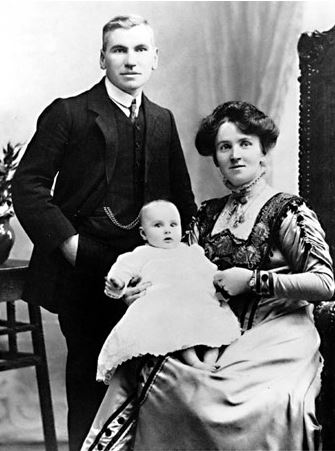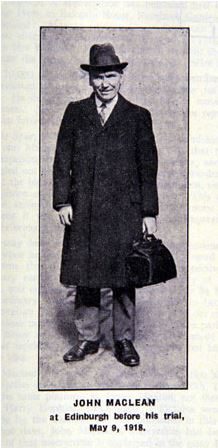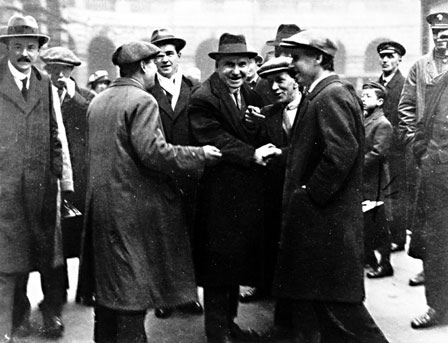The legend of John Maclean began in the Pollokshaws in Glasgow where he was born the sixth of seven children into a family where the father, a potter, had died when Maclean was nine years old.
His mother must have been a strong character because she kept a shop and took in lodgers, making sacrifices so that John could be educated.
After attending Pollokshaws Academy and Queen's Park School, he entered the Free Church Training College and then took an MA at Glasgow University. While there he made the acquaintance of James Maxton, later to be a central figure in the group known as the 'Red Clydesiders'.
From a Calvinist religious background and a total abstainer from alcohol and tobacco, Maclean was influenced into atheism by T.H. Huxley and Herbert Spencer. With the loss of religion came its replacement with socialism.
Like Ramsay MacDonald, he came into the movement through the Social Democratic Federation. He helped to found the Glasgow Teacher's Socialist Society and was involved in a number of other socialist causes, including the trade union and the cooperative movements.
He lectured on Marxist theory and economics across the West of Scotland and was heard by mass audiences. Amongst these were leaders of the Independent Labour Party like Maxton and Willie Gallacher.
Maclean lost his job as a schoolteacher in Govan because of his political activities and thereafter was a full-time Marxist organiser and educator.
When the Russian Bolshevik Revolution occurred in 1917, he was in his own words 'overjoyed'.
When the Russian Bolshevik Revolution occurred in 1917, he was in his own words 'overjoyed'.
His response brought him the title of Honorary President to the First Congress of Soviets and appointment by Lenin as its consul in Scotland, a post not at all recognised by the British government.
Maclean,like Keir Hardie,was a firm pacifist and through his denouncement of the war from 1914 onwards got himself arrested several times for sedition. In 1915 his imprisonment was bound up with his support of the Glasgow Rent Strike,when Maxton & Gallacher were also arrested.
In 1918, however, he was sentenced to five years imprisonment at Peterhead, treatment which aroused outrage in the Labour movement in the West of Scotland. He was released after six months but only after experiencing the brutal process of force-feeding when he went on hunger
strike. He had suspected that he was being drugged or poisoned.
After his release and the end of the war,he became yet more extremist and espoused the Irish Home Rule cause. He advocated a Workers' Republic for Ireland and then one for Scotland,to be achieved through revolution
After his release and the end of the war,he became yet more extremist and espoused the Irish Home Rule cause. He advocated a Workers' Republic for Ireland and then one for Scotland,to be achieved through revolution
Maclean believed that there would be a second world war, but expected it to be between a socialist Britain and the capitalist United States.
Twice more he was arrested.
Twice more he was arrested.
His isolation from fellow socialists increased and in 1923 he stood and campaigned for himself in the Gorbals constituency but, already in poor health from the rigours of prison, he contracted pneumonia and died.
He was in his own way a great man and inspired such as Hugh MacDiarmid. Some lasting memorials to him survived. His Tramp Trust Unlimited, founded in 1919, was concerned with the rights of industrial workers, length of the working week and a minimum wage.
The Russians named a street in St Petersburg for him.
Between the wars, socialism in the West of Scotland was a vibrant affair with its own culture of May Day rallies, socialist Sunday Schools and sports movements. It was, however, the Independent Labour Party, rather than
Between the wars, socialism in the West of Scotland was a vibrant affair with its own culture of May Day rallies, socialist Sunday Schools and sports movements. It was, however, the Independent Labour Party, rather than
revolutionaries like Maclean, which held the political ground and produced the parliamentary group which grew to be a major force. Maclean, nevertheless, is a legend.
-end-
-end-

 Read on Twitter
Read on Twitter




